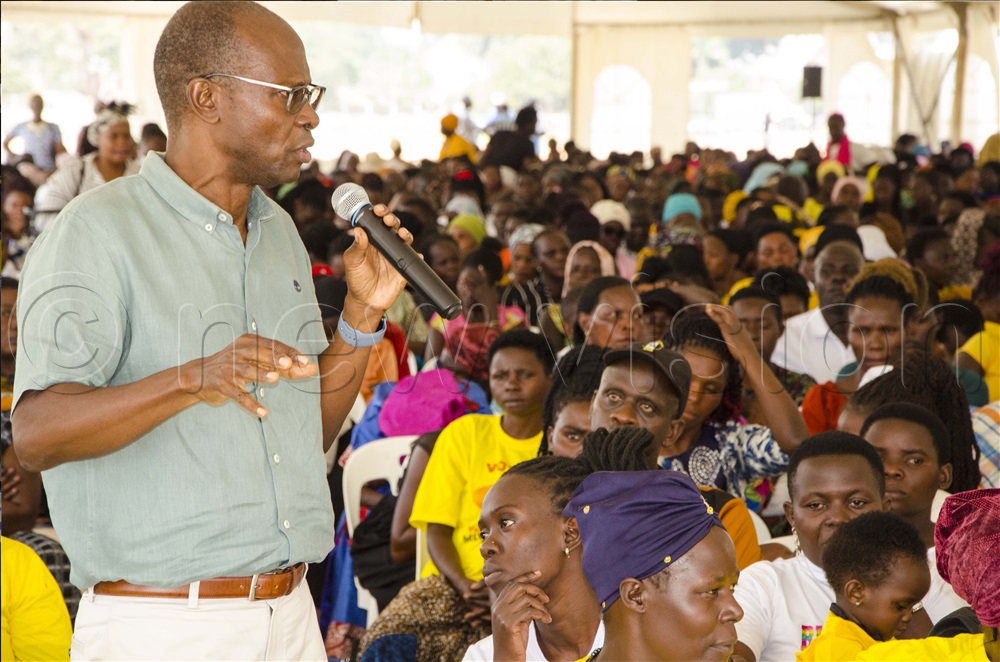Museveni warns Kampala hawkers against littering city
“Don’t throw banana peels, sugarcane, or any waste in the streets. Use proper disposal methods,” he stressed, while also cautioning vendors against trampling or destroying the city's increasingly scarce green spaces.
State House Comptroller Jane Barekye (Second Left), accompanied by Moses Byaruhanga, the Senior Presidential Advisor in charge of Political Mobilisation (Right), being given a basket full of yellow bananas as she delivered President Museveni’s over sh300m donation to Kampala street hawkers at Kololo Independence Grounds on Tuesday, July 29, 2025. (Photos by Colleb Mugume)
________________
President Yoweri Museveni has warned Kampala vendors against littering the city.
Kampala generates an estimated 2,500 to 3,000 tonnes of garbage daily, but the city authority (KCCA) only collects about 1,500 to 1,800 tonnes daily, leaving hundreds of tonnes strewn across streets, drainage channels, and open spaces. This waste management crisis is partly caused by littering.
Much of this litter is attributed to informal vending activities, especially hawkers who discard organic waste such as sugarcane peels, fruit skins, and plastic wrappings directly on city pavements or streets and alleys.
It’s against this background that President Museveni, through his State House representatives, has moved to strike a delicate balance between supporting the livelihoods of hawkers and restoring order to Kampala’s streets.
Moses Byaruhanga, Senior Presidential Advisor In-charge of Political Mobilization addressing vendors.
While delivering the President’s message to thousands of street vendors gathered at Kololo Independence Grounds on July 29, 2025, senior presidential advisor on mobilisation Moses Byaruhanga urged hawkers to keep the city clean.
Representing the President alongside State House comptroller Jane Barekye, Byaruhanga emphasised that hawkers must stop littering city spaces with waste generated from their merchandise.
“Don’t throw banana peels, sugarcane, or any waste in the streets. Use proper disposal methods,” he stressed, while also cautioning vendors against trampling or destroying the city's increasingly scarce green spaces.
Kampala central division mayor Salim Uhuru also warned KCCA enforcement officers, who often confiscate merchandise from street vendors in ongoing crackdowns.
“If any officer takes your fruits, record them on your mobile phone and we shall deal with them. You have the President's backing,” Uhuru declared to roaring applause.
Kampala affairs minister Minsa Kabanda said hawkers now have full government protection to trade.
“No hawker will get arrested by KCCA’s enforcement team. Your freedom to trade is now fully guaranteed by the President himself.”
Kabanda added that special attention will be given to sugarcane sellers and other informal vendors who were previously marginalised in city planning policies.
However, she urged vendors to reciprocate this support with responsibility.
“We must show that we can operate cleanly and responsibly. Let’s not throw rubbish all over after selling,” she added.
In a move to streamline identification and avoid clashes with law enforcement, Kabanda advised the vendors to wear National Resistance Movement (NRM) T-shirts they had received, marking them as part of a recognised group under the new arrangement.
The group of over 2,000 hawkers, mostly comprising women, received a cash token of shillings 100,000 each from the president.
Those who carried their merchandise received an additional shillings 50,000 per basket to cater for their goods, which they could have sold in the meeting’s duration.
The president’s message comes at a time when urban waste mismanagement is threatening to undermine the aesthetics and hygiene of Kampala.
According to KCCA officials, clogged drainage systems and illegal dumping sites are a direct result of unregulated vending and public negligence.
Still, many stakeholders see the Presidential directive as a significant step toward inclusive urban governance, one that acknowledges the economic realities of hawkers while reinforcing public order and environmental responsibility.